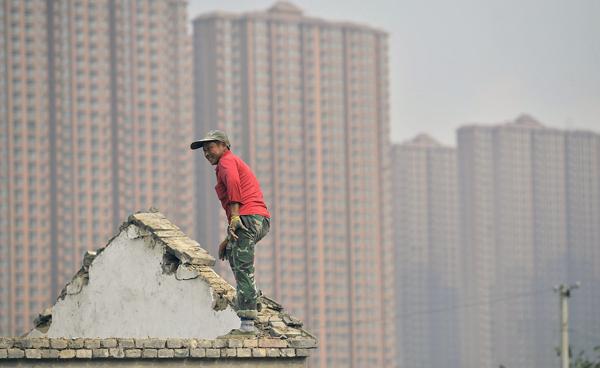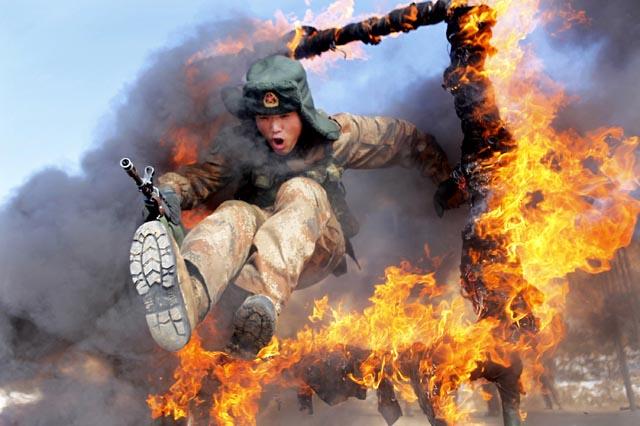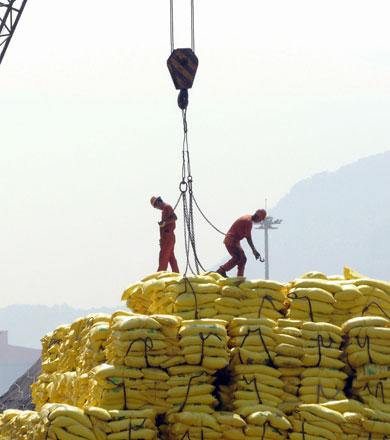You are here
China graft watchdog urges bank regulator ‘leave no stone unturned’
By Reuters - Sep 17,2015 - Last updated at Sep 21,2015

A man stands on the top of a building as farmers’ houses are demolished to make space for new property to be built, in front of a residential compound in Hefei, Anhui province, in this October 19, 2013 file photo (Reuters photo)
SHANGHAI — China’s banking regulators must “leave no stone unturned” rooting out illegal activity, the ruling Communist Party’s anti-graft watchdog said on Thursday, intensifying a campaign against graft launched by President Xi Jinping.
Dozens of senior officials have been investigated or jailed since Xi took over the party’s leadership in late 2012 and the presidency in 2013.
“In the past half year Huarong, Great Wall, Dongfang, Xinda, four other asset management companies, and China Merchants Bank have all been investigated, and concrete results achieved,” the party’s Central Commission for Discipline Inspection indicated.
It went on to urge China Banking Regulatory Commission officials to increase their vigilance.
“Handle in accordance with the rules problems of breaches of discipline and the law,” it said. “Ensure no stone is left unturned.”
China’s financial regulators have been under heavy pressure since stock markets began to tumble in mid-June after a long bull run, though the statement made no mention of that.
On Wednesday, the corruption watchdog said Zhang Yujun, the assistant chairman of the China Securities Regulatory Commission, was being investigated for “serious violations of the law”.
Police are also investing three top executives at Citic Securities, China’s largest broker, the official Xinhua news agency said on Tuesday.
Separately, sources said this week that angry Chinese authorities have seized up to 1 trillion yuan ($157 billion) from local governments who failed to spend their budget allocations, as Beijing seeks ways to stimulate economic growth which is at its slowest for 25 years.
The huge under-spend, linked to officials’ reluctance to splash out on big-ticket projects while authorities crack down on corruption, supports the argument of some economists that Chinese state investment has grown too slowly this year.
“In the past, local governments had asked for the money. Money was given, but no one acted,” said one of two sources, both of whom are close to the government.
They declined to be named as they are not authorised to speak to the media.
“Investments were not realised, and the money will be reallocated,” added the source, an economist. He did not elaborate on how the funds would be spent.
The repossessed money will pay for other investments, indicated the sources, as economic growth looks increasingly likely to fall below 7 per cent.
Lacklustre spending growth could be especially costly for China, as higher investment is seen by many as the best way to shore up activity, at least in the short-term, even if it does put deeper reforms on the back burner for now.
One trillion yuan of unspent funds is equivalent to about 6 per cent of China’s projected total government spending for 2015.
The finance ministry was not immediately available for comment when contacted by Reuters.
Fiscal spending boost
China’s economy has had a difficult year. Unsteady global demand and a wobbly Chinese housing market are expected to drag full-year growth to 7 per cent in 2015, though many analysts suspect the true figure to be much lower.
A near 40 per cent drop in China’s stock market in the summer and a shock 2 per cent devaluation in the yuan further roiled investors and policy makers.
The devaluation sparked accusations that China had started a round of competitive international currency devaluation.
China, which denies those allegations, has since been at pains to support the yuan, and some government economists said Beijing had decided the best way to stabilise the currency was by steadying the economy through higher fiscal spending.
“If economic growth stabilises, the pressure on capital outflows and the exchange rate could be eased,” said an economist at a commercial bank, who met Premier Li Keqiang to discuss China’s policy over the summer. “The central government is likely to step up spending.”
In another sign China is prepared to crank up fiscal stimulus, the powerful economic planner, the National Development and Reform Commission (NDRC), held an internal teleconference on Monday to discuss the ways to stabilise investment growth.
Measures to be taken include dispensing a second round of financing for unnamed construction projects by September, and ensuring that funding for projects paid for by the central government will be ready in the next two weeks.
An initial list of 13 public-private partnerships in project financing has also been announced, the NDRC remarked.
Corruption connection
To the surprise of some in Beijing, China’s unprecedented anti-graft campaign that has felled a powerful ex-domestic security chief, among others, has hindered investment.
While the campaign has been a hit with the public, it has also had the unintended consequence of scuppering spending as fearful officials eager to stay out of trouble resort to early retirement or dither over approving major projects.
That has annoyed Beijing, which has repeatedly threatened to punish procrastinating local governments by recalling their unspent budgets.
HSBC Bank estimated in May that China had 3.8 trillion yuan of unused fiscal funds carried over from previous years.
“Due to the crackdown [on corruption], most local officials have accomplished nothing,” said the second source, who has ties to the leadership.
Official data showed investment accounted for slightly more than a third of China’s economic growth in the first six months of this year.
Data over the weekend pointed to stubborn weakness in China’s economy. Growth in investment and factory output both missed forecasts in August, suggesting China needs to roll out more policy support to lift activity.
Related Articles
SHANGHAI — China's yuan hit a four-year low on Wednesday, falling for a second day after authorities devalued it, and sources said clamour i
China is targeting growth of about 7.5 per cent in 2014, Premier Li Keqiang said Wednesday, promising to “declare war” on pollution as the government pledges to transform the world’s second-largest economy.
BEIJING — China's top graft-busting agency has lambasted the country's powerful state-owned industries as being riddled with corruption and

















